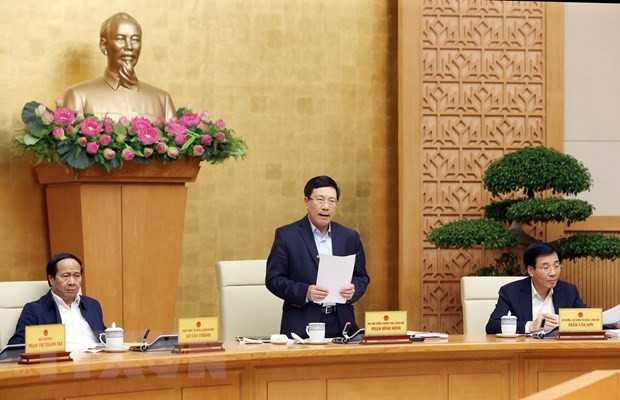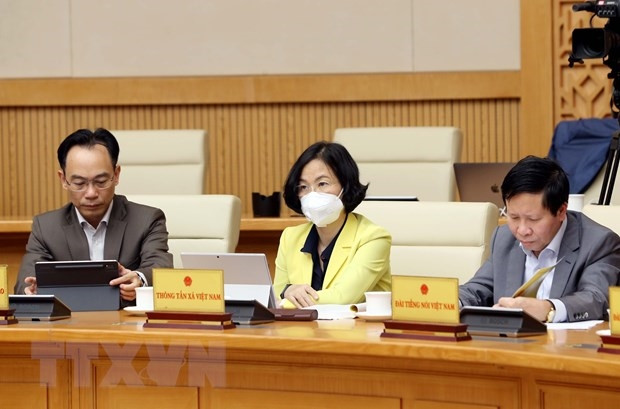Decentralization and delegation of power have been and are being adjusted according to the requirements of administrative reform, promoting proactiveness, creativity, and exploiting the potential and advantages of localities.

Deputy Prime Minister Pham Binh Minh speaks. Photo: Pham Kien/VNA
On the afternoon of November 4, at the Government headquarters, Politburo member and Permanent Deputy Prime Minister Pham Binh Minh chaired a national online conference with the theme "Promoting decentralization and delegation of power in state management" to implement the policy of promoting decentralization and delegation of power in state management as required by the Resolution of the 13th National Party Congress.
Also attending the conference at the central bridge were: Deputy Prime Minister Le Van Thanh; Minister, Head of the Government Office Tran Van Son; Minister of Home Affairs Pham Thi Thanh Tra; leaders of the Central Committee of the Vietnam Fatherland Front, the National Assembly's Law Committee, ministries, ministerial-level agencies, and government agencies.
At the connecting points in 63 localities, there was the participation of Chairmen of People's Councils, Chairmen of People's Committees of provinces and centrally-run cities and representatives of leaders of relevant departments, branches and agencies.
Decentralization: Not strong, lack of synchronization
Speaking at the opening of the conference, Deputy Prime Minister Pham Binh Minh stated that from the beginning of the term, the Government has considered promoting decentralization and delegation of power in state management as a major viewpoint in direction and administration, aiming to clearly define the authority and responsibility of the Government, Prime Minister, ministers, heads of ministerial-level agencies and local authorities in state management by sector, field and territory.
Decentralization and delegation of power have been and are being adjusted according to the requirements of administrative reform, promoting proactiveness, creativity, exploiting the potential and advantages of localities; creating favorable conditions for people and businesses; enhancing publicity and transparency in the direction and administration of each level and sector in the implementation organization; promoting innovation, streamlining the organization, and operating effectively and efficiently.
However, in recent times, especially through the practice of COVID-19 pandemic prevention and control, decentralization and delegation of power in state management have revealed shortcomings, inadequacies and limitations such as "leveling" among localities; not being reasonable and suitable in some sectors and fields; not being strong, lacking synchronization in resources and conditions to ensure implementation not being associated with administrative procedure reform; lacking planning, standards, regulations, and economic-technical norms in some sectors and fields; the mechanism for inspection, supervision, control of power, and sanctions for violations is not complete and synchronous.
The Deputy Prime Minister suggested that delegates focus on discussing and identifying tasks and solutions to promote decentralization and delegation of power in 2021, the Government's term 2021-2026 and in the coming time; thereby improving the efficiency and effectiveness of state management, promoting proactiveness and creativity, enhancing the responsibility of each level and each sector, especially the leaders, along with strengthening inspection, examination, supervision and control of power, contributing to building a democratic, professional, clean, effective and efficient state administration serving the people.
Clearly define the tasks, powers, authorities and responsibilities of each level and each sector.
The conference focused on discussing and exchanging frankly to clarify what has been done and what has not been done; difficulties, obstacles, limitations and weaknesses in decentralization and delegation of power in the past, both in terms of legal regulations and implementation practices; clearly analyzing the causes of limitations and weaknesses; good practices and lessons learned domestically and internationally.

Delegates attending the conference. Photo: Pham Kien/VNA
The presentations of ministries, branches and localities focused on clarifying the situation, results and lessons learned in implementing decentralization and delegation of powers in the fields of public investment, regional linkage development, and improving the investment and business environment; by sector and field; supervision activities of local state power agencies in the context of promoting decentralization and delegation of powers; decentralization and delegation of powers in the field of land; control of power in personnel work; work on building and organizing law enforcement; supervision and improvement of the effectiveness and efficiency of supervision activities of local state power agencies...
The conference also proposed specific contents, directions, tasks and solutions to promote decentralization and delegation of power in a practical and effective manner; effectively implement goals, targets and tasks in the spirit of the Resolution of the 13th National Party Congress and Resolution No. 50/NQ-CP of the Government on the Government's Action Program to implement the Resolution of the 13th National Party Congress.
The opinions expressed all emphasized that decentralization and delegation of power need to clearly define the tasks, powers, authorities, and responsibilities of each level and each sector; taking into account the conditions for protecting the environment.sureimplement; strengthen inspection, supervision, and control of the implementation of state power closely..., contributing to building a democratic, professional, modern, clean, effective, efficient state administration that serves the people.
After listening to opinions at the conference, Permanent Deputy Prime Minister Pham Binh Minh assessed that in recent times, decentralization and delegation of power have been promoted on a large scale between levels, sectors and fields, especially between the Government and ministries, sectors, and between the central and local levels.
Decentralization and delegation of power are carried out in conjunction with the process of perfecting institutions, administrative reform, building e-Government and digital Government, contributing to perfecting a streamlined and efficient apparatus.
Along with that, the Government, ministries and branches have focused on implementing macro management functions, building strategies, plans, mechanisms and policies, improving operational capacity and organizing implementation.
The Deputy Prime Minister emphasized that in the coming time, it is necessary to continue reviewing to amend and supplement according to authority, or propose amendments and supplements to the institutional system to create conditions for better implementation of decentralization and delegation of power; continue to simplify administrative procedures and enhance the responsibility of all levels and sectors; local authorities focus on improving the capacity to implement legal policies, organize the apparatus, and arrange appropriate human resources to promptly and effectively resolve work, enhance accountability, transparency, and publicity towards people and businesses.
The Deputy Prime Minister emphasized that decentralization and delegation of power must be closely linked to the characteristics, resources and capacity of each field and locality, thereby creating specific decentralization and delegation mechanisms and policies that are close to reality; and attention must be paid to strengthening inspection, examination and supervision work.
The Deputy Prime Minister assigned the Ministry of Home Affairs to preside over and coordinate with ministries, branches and localities to study the opinions of relevant agencies, continue to review and clearly propose the contents of tasks and solutions that need to be implemented in the coming time to promote decentralization and delegation of power in the spirit of the Resolution of the 13th National Party Congress and Resolution No. 50/NQ-CP of the Government on the Government's Action Program to implement the Resolution of the 13th National Party Congress, ensuring compliance with Conclusion No. 19-KL/TW dated October 14, 2021 of the Politburo on the Project to guide the Law-making Program for the 15th National Assembly term.
According to VNA